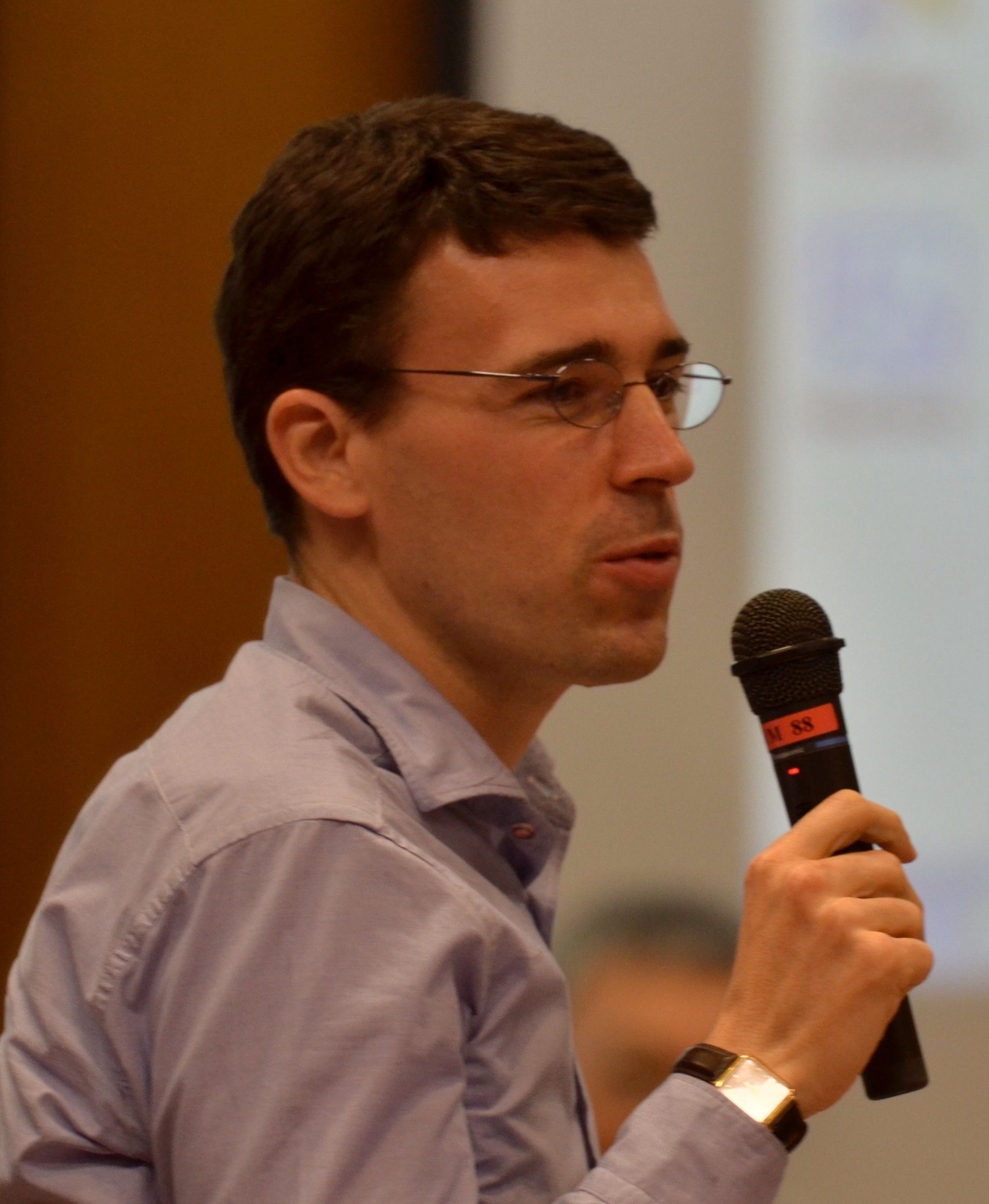- GU Home
- Großes Potential! Die Kleinen Fächer der Goethe-Universität Frankfurt
- Rassismus, Kolonialismus, Dekolonialisierung, Restitution
Rassismus, Kolonialismus, Dekolonialisierung, Restitution
Digitale Lesungs- und Vorlesungsreihe
In case of technical issues: Pia Gerhard (p.gerhard@em.uni-frankfurt.de)
Bei technischen Problemen: Pia Gerhard (p.gerhard@em.uni-frankfurt.de)
Di, 10.11.2020, 18:15 Uhr [Sinologie] - Prof. Dr. Sebastian Veg (Centre de Recherches historiques, EHESS)
Hong Kong's handover in historical perspective: from collaborative colonialism to the rise of local identity

Hong Kong's historical trajectory is arguably atypical, as a colony that did not gain independence. The territory's early development was predicated on what has been termed “collaborative colonialism" in which Hong Kong was understood to serve as a model for China, led by a local elite who were both pro-British and pan-Chinese nationalists. In the 1960s and 1970s, an anticolonial and pro-democracy movement emerged in the territory. However, the arrangements for the handover, made without significant input from the local population, and the repression of the 1989 democracy movement in China, provoked a split. After the handover, the pro-democracy movement became increasingly critical of Chinese administration, now sometimes described as “re-colonization," and the territory saw the rise of a strong localist movement that sparked a new round of pro-democracy protests.
For more information please visit Prof. Veg's Homepage.
Bildnachweis: Sebastian Veg
Mi, 18.11.2020, 18:15 Uhr [Vorderasiatische und Klassische Archäologie] - Dr. Thomas Kiely (British Museum London)
Archaeology and Empire. The perspective from early British Cyprus, 1878-1914
The relationship
between European imperialism and archaeological activity in the 19th and
20th century is widely discussed in modern discussions about the history of the
subject, particularly within the For more information please contact Dr. Kiely or visit his homepage. |  Bildrechte: © The Trustees of the British Museum Bildrechte: © The Trustees of the British Museum |
Do, 03.12.2020, 18:15 Uhr [Koreastudien] - Prof. Vladimir Tikhonov (University of Oslo)
The Afterlife of Japanese Colonialism: Historical Revisionism and History Wars in Contemporary South Korea
 Bildrechte: Vladimir Tikhonov | As it often happens elsewhere, especially in the post-colonial world, political struggle often takes the form of discursive 'memory wars' over various historical subjects in South Korea. Recently, Japanese colonial period provides the discursive field on which the left-nationalist progressives and statist/neo-liberal conservatives wage their political battles disguised as historical polemics. The present lecture will attempt to trace the evolution of two sides' positions and place their main claims into broader international context. It will also attempt to demonstrate how the discursive landscape around the 'memory wars' has been changing over time during the last decades. While in the 1990s and early 2000s the progressives were on offensive attacking the establishment for its continuity with colonial-era collaborators and consequent lack of national(ist) legitimacy, recently the conservatives are taking a relatively successful counter-offensive, claiming to debunk the 'nationalist mythology' in their new middlebrow bestsellers, such as Anti-Japanese Tribalism. All in all, these battles over historical memory are important for deeper understanding of both political and intellectual landscape in today's South Korea. For more information please contact Prof. Tikhonov or have a look at his presentation. |
Mi, 16.12.2020, 18:15 Uhr [Archäologische Wissenschaften] - Prof. Hans Peter Hahn (Goethe Universität Frankfurt)
Ethnographische Sammlungen mit Objekten aus Togo In Deutschland. Fragen der Bewertung, der Legitimierung und zukünftiger Umgangsweisen
Zahlreiche ethnologische Museen in Deutschland verfügen über
umfangreiche Sammlungen aus Togo. Diese in der Regel vor über 100 Jahren
gesammelten Gegenstände wurden und werden kaum ausgestellt. Sie sind
Teil der großen Masse von über 99% der ethnographischen Sammlungen im
deutschsprachigen Raum, die nicht in irgendeiner Ausstellung gezeigt
werden. Auch wenn diese Objekte seit langer Zeit in den Magazinen
schlummern, sind sie doch - wie die meisten Sammlungsgegenstände -
Zeugen einer Geschichte der Mobilität. Materielle Objekte sind
unterwegs, sie verbinden Kontinente und Kulturen, sie sind Indizien für
Ungleichheit und Ideologien der Unterwerfung, so wie es idealtypisch für
den Kolonialismus der Fall ist. Visit Prof. Hahn's website for more information. |  Bildrechte: Hans Peter Hahn Bildrechte: Hans Peter Hahn |
Di, 19.01.2021, 18:15 Uhr [Kinder- und Jugendliteratur] - Prof. Dr. Phil Nel und Dr. Ada Bieber (Kansas State University und HU Berlin)
Who is welcome?: Images of multiculturalism in German Picture Books Since 1989
Germany's
attempts to come to terms with the Holocaust are widely recognized. However, as
the nativist backlash against Germany's
recent welcoming of refugees indicates, the country has not yet won the battle
against racism and xenophobia. How do children's picturebooks represent this debate over who is welcome in
Germany? Placing international discourses of diversity in dialogue with German
multiculturalism, this talk explores multicultural German picturebooks over the
course of the last 30 years since the fall of the Berlin Wall. Pursuing the question of what types of difference contemporary picturebooks include in a multicultural German society, our talk asks why German multiculturalism tends not to acknowledge plurality within national identity. As we historicize the urgency of confronting racism and discrimination, we explore why post-reunification German picturebooks represent more continuity than departure from the messy history that they hope to transform. |  Bildrechte: Ada Bieber |  Bildrechte: Michael Henry | |
| For more information, please visit Phil Nel's Homepage or contact Phil Nel or Ada Bieber. |
Mi, 27.01.2021, 18:15 Uhr [Skandinavistik] - Ebbe Volquardsen (Universität Nuuk in Grönland)
Grönlands Sommer der Dekolonisierung
 Bildrechte: Ebbe Volquardsen | Im Sommer 2020 wurden die Grönländer*innen Zeugen
bei der Formierung einer neuen sozialen Bewegung, getragen von Studierenden,
Schüler*innen und jungen Künstler*innen und Aktivist*innen. Erklärtes Ziel:
eine kritische Vergangenheitsbewältigung sowie die in ihren Augen überfällige
mentale Dekolonisierung der einst von Dänemark kolonisierten grönländischen
Gesellschaft. Eine Farbattacke gegen die hundert Jahre zuvor errichtete Statue
des Missionars Hans Egede resultierte in einer von der Hauptstadt-Kommune
initiierten Abstimmung über eine mögliche Umplatzierung des Denkmals. Auch in
der hitzig geführten Debatte um die Umbenennung des dänischen
Speiseeisklassikers »Eskimo« fanden jungen Grönländer*innen dank informierter
und eloquenter Beiträge Gehör. Doch blieb es nicht beim Streit über einzelne
Symbole. Inspiriert von globalen Bewegungen wie »Black Lives Matter« und »Me
Too«, hält eine junge Generation von Influencer*innen die Debatten am Leben,
nicht zuletzt dank sozialer Medien. Im Fokus stehen die Neubewertung der
dänisch-grönländischen Kolonialgeschichte, die Aufarbeitung kollektiver
Traumata, die Rehabilitierung traditionellen indigenen Wissens sowie die
Revitalisierung von zu Kolonialzeiten diskreditierten Praktiken, etwa der traditionellen
Gesichtstätowierungen der Inuit. Während die neue Dekolonisierungsbewegung bei
Grönlands politisierter Jugend viel Anklang findet, reagieren ältere
Grönländer*innen mit Befremden, teils offener Ablehnung, auf ihre ungewohnt
meinungsstarken jungen Landsleute. Der Versöhnung mit der Vergangenheit, so
will es scheinen, muss zunächst eine Versöhnung zwischen den Generationen
vorausgehen. Ebbe Volquardsen lehrt seit 2016 als Associate
Professor für Kulturgeschichte Anthropologie und Geschichte an der Universität
Grönlands in Nuuk und war davor an der Humboldt-Universität zu Berlin sowie den
Universitäten Gießen und Greifswald tätig. | |
| For more information, please contact Ebbe Volquardsen. |
Di, 02.02.2021, 18:15 Uhr [Niederländische Sprache, Literatur und Kultur] - Cynthia McLeod (Schriftstellerin)
Life in the slavery Society Suriname in the 18th century
Surinam, ein Land an der Nord-Ost-Küste Süd-Amerikas mit einer Oberfläche von 163.821 km², wovon ca. 93 % Regenwald sind, war bis 1974 eine Kolonie der Niederlande. Nach der Unabhängigkeit blieb die Amtssprache Niederländisch. Das Gebiet des heutigen Surinam erhielt die niederländische West-Indische Compagnie 1667 von England, im Austausch gegen die Kolonie Nieuw-Amsterdam (das heutige New York). Die Niederländer benutzten das Land überwiegend für den Anbau von Zuckerrohr, Tabak und Kaffee. Es entstanden zahlreiche Plantagen. Für die Arbeit auf den Plantagen wurden Einwohner der Westküste Afrikas (Ghana, Benin,Togo) versklavt und verschifft. Erst 1863 wurde die Sklaverei in Surinam abgeschafft. Über ein Drittel der jetzigen Bevölkerung stammt von diesen damals Versklavten ab. Nach Abschaffung der Sklaverei wurden Einwohner aus Java und Indien als Vertragsarbeiter nach Surinam geholt. Das erklärt, wieso ca. 40 % der Bevölkerung asiatischer Herkunft ist. Im Jahre 1987 landete Cynthia McLeod (°1937), eine schwarze Surinamerin und Tochter des ersten Präsidenten Surinams, mit ihrem Erstlingsroman „Hoe duur was de suiker?“ (dts: „Surinam“) einen großen Erfolg. Es ist die bewegende Geschichte von Sklaven auf einer Zuckerrohrplantage, deren Leben viel weniger Wert ist als der Zucker, der in Europa in den Kaffee oder Tee kommt. Cynthia McLeod hat nachher noch verschiedene erfolgreiche, ins Englische und/oder Deutsche übersetzte Romane geschrieben. Ihr größtes Anliegen war ihr aber, die Geschichte der „“freien Negerin Elisabeth Samson (1715-1771)“ zu erzählen, die auch auf Englisch („The free Negress“) erschien. Cynthia McLeod kennt wie keine andere die Geschichte ihres Landes, hat zahlreiche Vorträge – auch an amerikanischen Universitäten - gehalten und hat eine Stiftung ins Leben gerufen, die das Haus von Elisabeth Samson vor dem Verfall retten soll. Dazu wurde eine interessante Webseite erschaffen. |  Bildrechte: Cynthia McLeod Bildrechte: Cynthia McLeod |
Mi, 10.02.2021, 18:15 Uhr [Afrikanistik] - Prof. Dr. Anne Storch (Universität zu Köln)
On voice
 Bildrechte: Anne Storch Bildrechte: Anne StorchSome examples and references can be found here (PDF). This lecture is a podcast and can be downloaded here. |
This is about the cracks and tricks in the “field" in African linguistics. Looking at fieldwork as a practice not only of data production but also of learning – of a trick, a language – and at the “field" as a site of past presences, I try to make use of the opportunity and slip through one of the cracks that are there, somewhere. What I find there is enchantment and wonder, also encountering. Also, and foremost so, theory, but theory that has no place in linguistic fieldwork manuals and handbook contributions. And while fieldwork quite obviously is about work (otherwise it would be fieldrest), I wish to ask, what if the linguistic fieldworker engaged in rest and pleasure instead of the production of disciplinary data? What if participant observation meant participating in sunset and in silence, for example? This idea rests on thinking about current critique of fieldwork in postcolonial contexts. Scholars such as Raewyn Connell (2007) – but also already Frantz Fanon (1967) – have argued that data production and theory making need to be understood as two separate activities in the academic knowledge industry, and that this separation needs to be understood as the continuation of exclusion. What gets excluded is theory, and it is fieldwork where the bifurcation of what some may wish to call northern and southern theory respectively happens. Yet, it seems as if the first thing to be learned there, out there in the cracks of the “field", is that such binaries remain unhelpful. Because the many voices we simply should finally listen to talk to academic players, have something to say about disciplinary practice, and tell of other possibilities to know about things. As they continue to speak out of corpora, archives and collections, they signify that nothing is under control, not even the imaginary division between data and theory, or southern and northern thought, or Self and Other. Conell, Raewyn. 2007. Southern Theory: The Global Dynamics of Knowledge in Social Science. Cambridge: Polity Press. Fanon, Frantz. 1967. Black Skin, White Masks. New York: Grove. |
Di, 16.02.2021, 18:15 Uhr [Theaterwissenschaft] - Jasmine E. Johnson, Ph.D. (University of Pennsylvania)
Living, Rooms: Ritual and Refuge in Jennifer Harge's FLY/DROWN.
- Aktuelles und Presse
- Pressemitteilungen
- Öffentliche Veranstaltungen
- Uni-Publikationen
- Aktuelles Jahrbuch
- UniReport
- Forschung Frankfurt
- Aktuelle Stellenangebote
- Frankfurter Kinder-Uni
- Internationales
- Outgoings
- Erasmus / LLP
- Goethe Welcome Centre (GWC)
- Refugees / Geflüchtete
- Erasmus +
- Sprachenzentrum oder Fremdsprachen
- Goethe Research Academy for Early Career Researchers
- Forschung
- Research Support
- Forschungsprojekte, Kooperationen, Infrastruktur
- Profilbereich Molecular & Translational Medicine
- Profilbereich Structure & Dynamics of Life
- Profilbereich Space, Time & Matter
- Profilbereich Sustainability & Biodiversity
- Profilbereich Orders & Transformations
- Profilbereich Universality & Diversity







